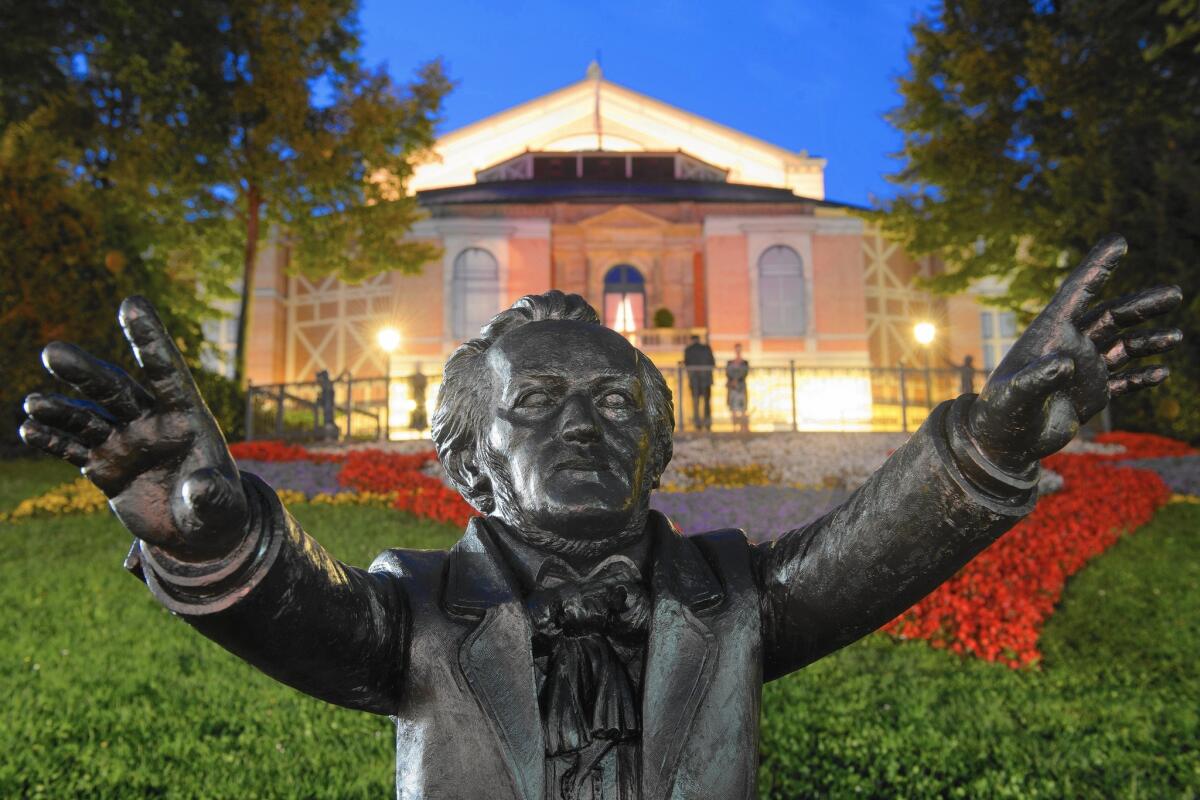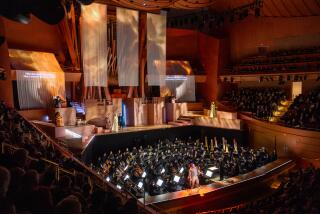Wagner descendant heads a music fest -- Beethoven, not Bayreuth

- Share via
Reporting from Bonn, Germany — Nike Wagner suffered a bitter defeat in a family power struggle over Germany’s Bayreuth Festival, which is dedicated to the operas of her great-grandfather, Richard Wagner. But she is back on the European classical music scene, with a festival devoted to a different composer: Ludwig van Beethoven.
The move gives her a much more sympathetic musical genius to plan a festival around.
The pleasure some music lovers take in the operas of her famous ancestor Richard (1813-83) is mitigated by the composer’s loathsome personality. He was a vicious anti-Semite who inspired Nazi dictator Adolf Hitler, a frequent attendee at the Bayreuth Festival. Nike Wagner’s grandmother Winifred was an early and enthusiastic Nazi supporter.
There is no such stigma attached to Bonn homeboy Beethoven (1770-1827), a composer of enduring and universal popularity. Almost two centuries after the composer’s death, new biographies keep arriving, including Jan Swafford’s 1,000-page “Beethoven: Anguish and Triumph,” published this summer.
“Curiously enough, Beethoven never goes out of style. His stream of sheer energy and inventiveness gets to you somehow,” said Wagner, 69. “Even people who don’t know musical forms or traditions can understand how Beethoven would take a theme and improvise the changings of it. It’s one of the sources of the pleasure of Beethoven.”
Wagner joined forces with the late Gerard Mortier in a 2008 bid to become artistic co-directors at Bayreuth. Although the festival has been public property since 1976, when the Wagner family sold the festspielhaus, or concert hall and grounds, to the government, her uncle Wolfgang had a legally binding contract to choose his successors. And he chose his daughters, Nike’s first cousins.
Now, having just completed her first year as Beethoven festival director, Wagner is largely at peace about losing the squabble. There are traces of bitterness: It rankles her that the German government deems Bayreuth to be of international importance but not the Bonn festival. The Bayreuth receives millions of euros in federal aid, the only such festival so subsidized.
“So Wagner is more important than Beethoven?” said Wagner. “That’s not correct.”
With a PhD in German literature from Northwestern University, Wagner says she is neither a musicologist nor an impresario, although she ran a music festival in Weimar, Germany, dedicated to another famous progenitor, 19th century pianist and composer Franz Liszt. “In German, you would call me a ‘kunstmensche’ or arts person. I try to make good arts programs.”
Wagner takes questions about her family’s past Nazi links unflinchingly.
She lived the consequences of her family’s Nazi associations. Allied bombers struck the Wagner mansion, Villa Wahnfried, in Bayreuth in the waning days of the war in 1945, partly destroying it. For years after her birth that year, Nike and her extended family lived amid the ruins until the property was taken over by the state and made a museum in 1976.
“Hitler was the chancellor of Germany, so even if I blame my grandmother for a lot of things, she could not have prevented the legally elected leader from visiting her festival,” said Wagner, whose 2001 book, “The Wagners: The Dramas of a Musical Dynasty,” details the family history. “What I do blame her for is taking Hitler into the family, into the inner circle. There was no need for her to do that.”
She wouldn’t mind if she were asked less about her great-grandfather and more about Liszt, whose daughter Cosima married Richard Wagner in 1870, making the composer Nike Wagner’s great-great-grandfather.
Liszt’s generous, expansive personality contrasts sharply with Wagner’s. He played a series of benefit concerts to pay for the Beethoven statue unveiled in 1845 in the town’s main market square to mark the native son’s 75th birthday. He then organized the first Beethoven Festival that same year after insisting the Bonn city fathers build a 2,000-seat auditorium that no longer exists.
“Poor Wagner is blamed for his bad character, but you are in heaven with Franz Liszt. Rarely are artists so unselfish and so serene in promoting others, inventing festivals, having so many students and doing everything for them,” said Nike Wagner.
That Liszt’s descendant is now running the monthlong, 60-concert Beethoven Festival means the Liszt stewardship has come full circle.
Attendance at the Beethoven Festival this year maintained the upward trend begun under previous director Ilona Schmiel, who has moved on to manage Zurich’s Tonhalle Orchestra. One of many festivals on a crowded European music calendar, the Beethoven fest increasingly “punches above its weight,” in the words of one observer, particularly for musicians.
“Playing in Beethoven’s hometown is always a big honor and a big responsibility,” said Russian pianist Arcadi Volodos, the soloist in the final night’s program.
Said Paavo Jarvi, who conducted the German Chamber Philharmonic Bremen orchestra to accompany Volodos in Beethoven’s 3rd piano concerto, said: “It’s surreal to think that Beethoven was actually a human being who lived in a small town because for us he is sort of a god. Living up to the honor of playing Beethoven in the city of Beethoven is felt by all the artists who come here.”
Wagner said she plans to commission a portable 600-seat “pop-up” performance hall by avant-garde Paris architect Hans-Walter Muller, a much-needed venue to host chamber music and lectures. The “pop-up” structure will augment the main concert hall, the 1,500-seat, 1950s-era Beethovenhalle whose poor sight lines and acoustics have given impetus to an ongoing campaign for a new main auditorium.
Architects have submitted designs, but local politicians haven’t agreed on a business plan to finance it, she said.
Wagner said her aim is to make Beethoven relevant to the contemporary arts scene and to youth.
She has lined up the requisite star power for next year’s event, including conductors Daniel Barenboim, Zubin Mehta and pianist Andras Schiff. Past headliner Gustavo Dudamel, the Los Angeles Philharmonic music director, won’t be appearing, however. “He’s too expensive, at least when it’s with El Sistema,” Wagner said.
In a bid to capture elusive younger audiences, she will expand the festival beyond its “strictly musical” parameters to include modern dance, street theater and art installations to explore how contemporary artists perceive the genius of Beethoven.
“I would like to open up Bonn and the future of the festival to Beethoven as seen in our times. He was a revolutionary and free-spirited. What are we obliged to do with him? To use him as an economic motor? As a museum? Beethoven is very much alive, and it is my ambition to show this. “
Kraul is a special correspondent based in Bogota, Colombia.
More to Read
The biggest entertainment stories
Get our big stories about Hollywood, film, television, music, arts, culture and more right in your inbox as soon as they publish.
You may occasionally receive promotional content from the Los Angeles Times.










